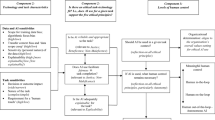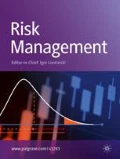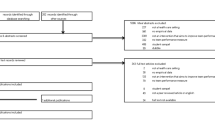Abstract
Although the concept of dynamic risk assessment has in recent times become more topical in the training manuals of most high-risk domains, only a few empirical studies have reported how experts actually carry out this crucial task. The knowledge gap between research and practice in this area, therefore, calls for more empirical investigation within the naturalistic environment. In this article, we present and discuss the problem-solving strategies employed by 16 experienced operational firefighters using a qualitative knowledge elicitation tool – the critical decision method. Findings revealed that dynamic risk assessment is not merely a process of weighing the risks of a proposed course of action against its benefits, but rather an experiential and pattern recognition process. The article concludes by discussing the implications of designing training curriculum for the less experienced officers using the elicited expert knowledge.


Similar content being viewed by others

Notes
Note that participants’ rank and years of experience are displayed in parenthesis next to their names (pseudonyms) for ease of reference.
References
Burke, E. (1997) Competence in command: Recent R&D in the London fire brigade. Journal of Managerial Psychology 12 (4): 261–279.
Burke, E. and Hendry, C. (1997) Decision making on the London incident ground: An exploratory study. Journal of Managerial Psychology 12 (1): 40–47.
Chase, W.G. and Simon, H.A. (1973) Perception in chess. Cognitive Psychology 4 (1): 55–81.
Clancy, D. (2011) Can acceptable risk be defined in wildland firefighting? Proceedings of the Second Conference on the Human Dimensions of Wildland Fire. Newtown Square, PA: U.S. Department of Agriculture, Forest Service, Northern Research Station.
Cohen, M.S., Freeman, J.T. and Wolf, S. (1996) Meta-recognition in time-stressed decision making: Recognizing, critiquing, and correcting. Human Factors 38 (2): 206–219.
Dane, E. and Pratt, M.G. (2009) Conceptualizing and measuring intuition: A review of recent trends. In: G.P. Hodgkinson and J.K. Ford (eds.) International Review of Industrial and Organizational Psychology. Vol. 24. Chichester, UK: Wiley, pp. 1–40.
Dreyfus, S.E. (2004) The five-stage model of adult skill acquisition. Bulletin of Science, Technology & Society 24 (3): 177–181.
Endsley, M.R. (1995) Towards a theory of situational awareness. Human Factors 37 (1): 32–64.
Eraut, M. (2000) Non-formal learning and tacit knowledge in professional work. British Journal of Educational Psychology 70 (1): 113–136.
Ericsson, K.A., Prietula, M.J. and Cokely, E.T. (2007) The making of an expert. Harvard Business Review 85: 114–121.
Feldon, D.F. (2007) The implications of research on expertise for curriculum and pedagogy. Journal of Education Psychology Review 19 (2): 91–110.
Fessey, C.A. (2002) Capturing expertise in the development of practice: Methodology and approaches. Learning in Health and Social Care 1 (1): 47–58.
Flin, R. (1996) Sitting in the Hot Seat: Leaders and Teams for Critical Incident Management. New York: John Wiley.
Gobet, F. and Simon, H.A. (1996) Recall of random and distorted chess positions: Implications for the theory of expertise. Memory & Cognition 24 (4): 493–503.
Gobet, F. (2005) Chunking models of expertise: Implications for education. Applied Cognitive Psychology 19 (2): 183–204.
Goldstein, D.G. and Gigerenzer, G. (2002) Models of ecological rationality: The recognition heuristic. Psychological Review 109 (1): 75–90.
Grimwood, P. (2003) Tactical firefighting: A comprehensive guide to compartment firefighting & live fire training. Fire tactics [Web page], 40–80, http://www.firetactics.com/FLASHOVER%20%20FIREFIGHTERS%20NIGHTMARE.pdf, accessed 13 January 2015.
Harré, M., Bossomaier, T. and Synder, A. (2012) The perceptual cues that reshape expert reasoning. Nature Scientific Reports 2 (502): 1–9.
Hilbig, B.E., Scholl, S.G. and Pohl, R.F. (2010) Think or blink – is the recognition heuristic an ‘intuitive’ strategy? Judgment and Decision Making 5 (4): 300–309.
HM Fire Service Inspectorate (1999) Fire Service Manual Volume 2. Fire Service Operations. HM Fire Service Inspectorate Publications. London: HMSO.
HM Government (2008) Fire and Rescue Manual, Fire Service Operations, Incident Command. Vol. 2. London: TSO.
Hoffman, R.R., Crandall, B. and Shadbolt, N.R. (1998) Use of the critical decision method to elicit expert knowledge: A case study in the methodology of cognitive task analysis. Journal of Human Factors and Ergonomics Society 40 (2): 254–276.
Hoffman, R.R., Shadbolt, N.R., Burton, A.M. and Klein, G.A. (1995) Eliciting expert knowledge: A methodological analysis. Organizational Behavior and Human Decision Making 62 (2): 129–158.
Hogarth, R.M. (2003) Educating Intuition: A Challenge for The 21st Century. Barcelona, Spain: Centre de Recerca en Economia Internacional.
Ingham, V. (2007) Decisions on fire. Journal of Media and Culture, 10 (3), http://journal.media-culture.org.au/0706/06-ingham.php, accessed 15 March 2015.
Ingham, V. (2008) Crisis communication and multimodal decision making on the fireground. Australian Journal of Emergency Management 23 (3): 9–13.
Johnson, J.G. and Raab, M. (2003) Take the first: Option generation and resulting choices. Organizational Behaviour and Human Decision Processes 91 (2): 215–229.
Kahneman, D. and Klein, G. (2009) Conditions for intuitive expertise. A failure to disagree. Journal of the American Psychological Association 64 (6): 515–526.
Klein, G., Calderwood, A.R. and MacGregor, D. (1989) Critical decision method for eliciting knowledge. IEEE Transactions on Systems, Man, and Cybernetics 19 (3): 462–472.
Klein, G. (2003) The Power of Intuition: How to Use Your Gut Feelings to Make Better Decisions at Work. New York: Doubleday.
Klein, G. (2008) Naturalistic decision making. Human Factors: The Journal of the Human Factors and Ergonomics Society 50 (3): 456–460.
Klein, G., Calderwood, R. and Clinton-Cirocco, A. (2010) Rapid decision making on the fire ground: The original study plus a postscript. Journal of Cognitive Engineering and Decision Making 4 (3): 186–209.
Lamb, K.J., Davies, J., Bowley, R. and Williams, J. (2014) Incident command training: The introspect model. International Journal of Emergency Services 3 (2): 131–143.
Lipshitz, R., Klein, G., Orasanu, J. and Salas, E. (2001) Focus article: Taking stock of naturalistic decision making. Journal of Behavioural Decision Making 14 (5): 331–352.
Lipshitz, R., Omodei, M., MacLennan, J. and Wearing, A. (2007) What’s burning? The RAWFS heuristic on the fire ground. In: R.R. Hoffman (ed.) Expertise Out of Context: Proceedings of the Sixth International Conference on Naturalistic Decision Making, New York : Lawrence Erlbaum Associates, pp. 97–111.
Marewski, J.N., Gaissmaier, W. and Gigerenzer, G. (2010) Good judgments do not require complex cognition. Cognitive Process 11 (2): 103–121.
McLennan, J., Holgate, A.M., Omodei, M.M. and Wearing, A.J. (2006) Decision making effectiveness in wildfire incident management teams. Journal of Contingencies and Crisis Management 14 (1): 27–37.
Okoli, J.O., Weller, G., Watt, J. and Wong, B.L.W. (2013) Decision making strategies used by experts and the potential for training intuitive skills: A preliminary study. Proceedings of the 11th International Conference on Naturalistic Decision Making. Paris, France: Arpege Science Publishing, pp. 227–232.
Okoli, J.O., Weller, G. and Watt, J. (2014) Eliciting experts’ knowledge in emergency response organizations. International Journal of Emergency Service 3 (2): 118–130.
Okoli, J.O., Weller, G. and Watt, J. (2015) Information processing and intuitive decision making on the fireground: Towards a model of expert intuition. Cognition, Technology and Work. doi: 10.1007/s10111-015-0348-9.
Paas, F., Renkl, A. and Sweller, J. (2004) Cognitive load theory: Instructional implications of the interaction between information structures and cognitive architecture. Instructional Science 32 (1): 1–8.
Perry, N.C. and Wiggins, M.W. (2008) Cue generation amongst firefighters: Competent vs. expert differences. Proceedings of the Human Factors and Ergonomics Society Annual Meeting. New York, 52 (4): 418–422.
Polanyi, M. (1958) Personal Knowledge: Towards a Post-Critical Philosophy. Chicago, IL: University of Chicago Press.
Polanyi, M. (1962) Tacit knowing: Its bearing on some problems of philosophy. Reviews of Modern Physics 34 (4): 601–615.
Pollock, E., Chandler, P. and Sweller, J. (2002) Assimilating complex information. Learning and Instruction 12 (1): 61–86.
Rasmussen, J. (1983) Skills, rules and knowledge: Signals, signs and symbols, and other distinctions in human performance models. IEEE Transactions on systems, Man and Cybernetics 13 (3): 257–267.
Rosen, M.A., Shuffler, M. and Salas, E. (2010) How experts make decisions: Beyond the JDM paradigm. Industrial and Organizational Psychology 3 (4): 438–442.
Shanteau, J. (1992) Competence in experts: The role of task characteristics. Organisational Behaviour and Human Decision Processes 53 (2): 252–266.
Sweller, J. (1994) Cognitive load theory, learning difficulty, and instructional design. Learning and Instruction 4 (4): 295–312.
Tissington, P.A. and Flin, R. (2005) Assessing risk in dynamic situations: Lessons from fire service operations. Risk Management 7 (4): 42–51.
Wiley, J. (1998) Expertise as mental set: The effects of domain knowledge in creative problem solving. Memory & Cognition 26 (4): 716–730.
Wong, B.L.W. (2000) The integrated decision model in emergency dispatch management and its implications for design. Australian Journal of Information Systems 2 (7): 95–107.
Wong, B.L.W. (2004) Data analysis for the critical decision method. In: D. Diaper and N. Stanton (eds.) Task Analysis for Human-Computer Interaction. Mahwah, NJ: Lawrence Erlbaum Associates, pp. 327–346.
Zsambok, C.E. (1997) Naturalistic decision making: Where are we now? In: C.E. Zsambok and G.A. Klein (eds.) Naturalistic Decision Making. Mahwah, NJ: Erlbaum, pp. 3–16.
Author information
Authors and Affiliations
Corresponding author
Rights and permissions
About this article
Cite this article
Okoli, J., Watt, J., Weller, G. et al. The role of expertise in dynamic risk assessment: A reflection of the problem-solving strategies used by experienced fireground commanders. Risk Manag 18, 4–25 (2016). https://doi.org/10.1057/rm.2015.20
Published:
Issue Date:
DOI: https://doi.org/10.1057/rm.2015.20



